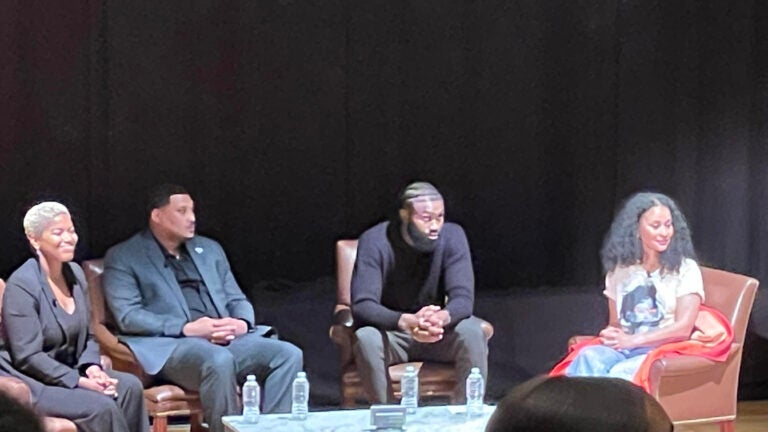At the MFA, Jaylen Brown opens up about leadership and a promise he made to himself
Brown was part of a panel for a discussion called "The City Talks: Leading From Anywhere."

Jaylen Brown made a promise to himself in 2019 that he would be unapologetically himself, even within the confines of a multi-billion dollar corporate enterprise such as the National Basketball Association.
Seven years into his career with the Celtics, and fresh off of his first NBA Finals appearance, the All-Star forward reflected on his early days in the organization and his growth as a leader during a free public forum at the Museum of Fine Arts on Monday night.
The discussion was titled “The City Talks: Leading From Anywhere.” The panel of featured guest speakers consisted of Brown, Christa Brown, founder of the Free Soil Arts Collective, and Frank Farrow, Executive Director of the Mayor’s Office for Black Male Advancement.
The event was moderated by the Boston Globe’s Jeneé Osterheldt, who created the national Murrow Award-winning multimedia series “A Beautiful Resistance.”
Jaylen Brown said when he first came to Boston, he realized that there are expectations for players to act a certain way in the NBA.
“They want you to act, look, think, and be almost in a sense, the same,” Brown said. “I talked about it in a talk at Berkeley and called it dynamic normalization. They want all of us to be ‘safe.’ But a lot of my favorite athletes, Kareem [Abdul-Jabbar], Jim Brown, Bill Russell, a lot of those athletes were not safe. They were controversial, they were political, they used their platforms and made statements. So why are you training me to be the opposite?”
Osterheldt said safety doesn’t come from that kind of normalization.
“Safety is in the moves that Bill Russell and Muhammad Ali made,” Osterheldt said. “Safety is in the moves that Martin Luther King made. You can’t have safety without radical change. It’s going to require a certain amount of resistance so that we can be safe. Because when we talk about being safe, safe for whom?”
Brown said he’s at a point where he feels comfortable coming into the Celtics’ facility and talking to president of basketball operations Brad Stevens the same way he would talk to point guard Marcus Smart.
“I’m making sure they know, I’m unapologetically Jaylen 100 percent of the time,” Brown said. “I’m walking in, I’m dapping people up, I’ve got my do-rag, I’ve got my braids, I’m like ‘yo, Brad what’s good with you, you alright?’ You know what I mean?”
The fight for people of color to be able express their full selves stretches far beyond the NBA. It affects people across all walks of life.
Christa Brown said that in 2020 some of the artists she deals with gave her feedback that they felt censored, causing her examine all the steps she took on a daily basis to fit in.
Each of the panelists shared sentiments that Boston can do a better job of being more accepting of diverse cultures.
“I want every sector to be as rich as the street,” Christa Brown said. “The faces you see, the cultures represented, the folks in power.
“I think Ayanna Pressley said this: ‘The people closest to the pain should be closest to the power’. I want to see what that looks like, what that feels like. To maybe, not slowly do away with, but to somehow have folks in power who are more relatable, from the actual community instead of hooking up friends or having people representing you with no connection.”
Jaylen Brown, who is from Atlanta, said he’s been in Boston long enough to see “obvious” changes that need to be made.
“My family is here, so I consider myself a part of the community,” Brown said. “And I know a lot of people are like, ‘Boston is great’, ‘Boston is wonderful,’ ‘what are all these complaints about, why would anybody want to change anything?’ I would push for them to see the other side of the coin. There’s a lot of alarming statistics that jump off the page when you look at Boston on paper.”
Among the issues Brown said he’d like to see addressed are: The city’s racial wealth disparity, the incarceration rate among people of color, and the lack of businesses owned by people of color in the Seaport, Back Bay, and Downtown Boston.
Brown owns a clothing store in the Seaport called 7uice.
He’d like to see systemic barriers to advancement reduced, which is what Farrow is tasked with working in the Mayor’s office.
“For me, the next Boston is me being out of a job,” Farrow said, adding that he wants the city to reach a place where the systemic barriers are removed and positions like his are no longer needed.
The discussion was part of a series of initiatives that the MFA and Jaylen Brown’s 7uice Foundation are collaborating on this fall.
“I try to use my platform to elevate other people’s voices,” Brown said. “I think it’s important, it’s imperative really, it’s a responsibility from my parents for me in order to pull others up as you continue to move forward. What good is it if I make it to a certain platform and only think about myself? It’s important to think about others and think about the community that I come from. Because a lot of times there’s a disconnect as I navigate and make it through these barriers.”